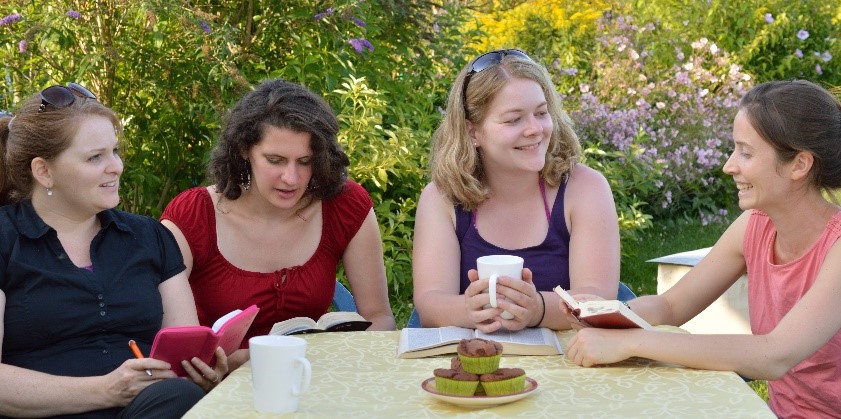We had the experience but missed the meaning. T.S. Eliot
There are moments that mark us for life. At times they are big, important experiences, such as the birth of a child or the realisation that we are in love. But sometimes, they are simple, hidden insights: words heard or silence appreciated.
This is the moment I realised how powerful my words could be.
Alex was a medical student I worked with for a while: a wonderful, committed, intelligent, agnostic, who wanted to be the best doctor he could. I facilitated a weekly meeting on faith and ethics. Most participants were Christian, but it was open to whoever wanted to come. Alex was always there – present, involved, assiduous – and we became friends. Those meetings were fantastic; we would chat, argue and dream. My other roles involved teaching people to pray – opening spaces where people could find (or be found by) a personal encounter with the God revealed in Jesus.
One day, while praying, I realised I wanted him to experience this side of life: what I had in a personal relationship with God. The (summarised) conversation went as follows:
Me: “You know I respect you deeply and appreciate our friendship. I love your values, and your honesty… but I need to say that, since faith brings me so much, I would love you to have that experience for yourself.”
Alex: “If you had never said this to me, I would either doubt our friendship, or doubt your faith.”
In that moment (and others that followed it), I woke up to the miraculous power of words spoken on time and spoken out of love. My friend already knew that I cared, that I valued our friendship and that behind everything I did was my faith. But it took the risk of a personal conversation, on my part, for him to take a step towards the encounter with our personal God.
Let’s think about words: think of the first words of your child, or of the first time someone told you they loved you. Or of words that have hurt you and stayed for ages in your memory, a chain around your self-belief and possibilities. Words are transcendent: they open worlds or shut them. Words are powerful beyond measure.
Now let’s think about how God has chosen to act in this world. The self-revealing God chose words, and the Word incarnated, as the main means of self-revelation:
 ”After speaking in many and varied ways through the prophets, ‘now at last in these days God has spoken to us in His Son’ (Heb. 1:1-2). For God sent the Son, the eternal Word, who enlightens all humanity… and tell them of the innermost being of God (see John 1:1-18).”
”After speaking in many and varied ways through the prophets, ‘now at last in these days God has spoken to us in His Son’ (Heb. 1:1-2). For God sent the Son, the eternal Word, who enlightens all humanity… and tell them of the innermost being of God (see John 1:1-18).”
Dei Verbum 2
God’s intent is a conversation of love:
“Every man and woman appears as someone to whom the word speaks, challenges and calls to enter this dialogue of love through a free response. Each of us is thus enabled by God to hear and respond to his word. We were created in the word and we live in the word; we cannot understand ourselves unless we are open to this dialogue.”
“Faith comes from what is heard, and what is heard comes from the word of Christ” (Rm 10:17). That is to say, the normal way in which God speaks to humanity, and through which people come to know God, to name God in their lives and open themselves the action of the Spirit, is through the spoken words of someone, that mediate God’s presence to and for them. This is not to underestimate the importance of witness or of charity, without which there would be nothing to say and no questions raised. But without words we have not finished our work.
In Catholic theology, we call this the sacramentality of the Word: the potential of the word to mediate divine presence into human living. Scripture is teeming with this reality. God’s word does what it says: “‘Let there be light’, and there was light!” (cf. Gn 1: 3) It is like the rain or snow that drenches the earth, making it bring forth and sprout, giving seed for the sower and bread for the eater (cf. Is 55:10-11); or a double-edged sword, piercing thoughts and intentions of listeners and speakers alike (cf. Heb 4:12)! And it is not an alien word, but one we recognise as source, as origin “through whom all things came into being” (cf. Jn 1:1-4).
“I know my own and my own know me.” (Jn 10:14). Most of all, it is a word that needs a voice! This is God’s greatest risks – choosing to pass through who we are, the timbre and tone of our personal expression: “There! I put my words into your mouth!” (Jer 1:9) Nowhere is this more vividly expressed than in Ezekiel’s image of the valley of dead and dry bones that come to life – not through direct divine intervention, but rather through the prophet’s voice: “Mortal, can these bones live?” I answered, “O Lord God, you know.” Then, God to me, “Prophesy to these bones!” (cf. Ezek 13:1-14)
A previous article in The Bridge spoke of discerning our personal charisms. In this piece, I would suggest that intrinsic to the vocation of every Christian is the gift and call, in some way, small or large, to speak the Word of God to others; to preach even, although, for many, the word is not a comfortable one. From baptism, we are all prophets, priests and kings. “In virtue of their baptism, all the members of the People of God have become missionary disciples (cf. Mt 28:19).” This involves expressing the reason for our faith – in the many and varied ways life opens for us.
 “Today, as the Church seeks to experience a profound missionary renewal, there is a kind of preaching which falls to each of us as a daily responsibility. It has to do with bringing the Gospel to the people we meet, whether they be our neighbours or complete strangers. This is the informal preaching which takes place in the middle of a conversation… unexpectedly and in any place: on the street, in a city square, during work, on a journey.”
“Today, as the Church seeks to experience a profound missionary renewal, there is a kind of preaching which falls to each of us as a daily responsibility. It has to do with bringing the Gospel to the people we meet, whether they be our neighbours or complete strangers. This is the informal preaching which takes place in the middle of a conversation… unexpectedly and in any place: on the street, in a city square, during work, on a journey.”
Many of us were brought up to think that to evangelise is to impose our beliefs on others. The “Catholic” way is witness and invitation, rather than thinking that we are somehow better than others and need to save them.
But both of these positions are incomplete. We do not evangelise because we are better; we all know people with more integrity than ours without the support of Christian faith. We mission because life in Christ makes sense and gives a depth and fullness that we would be selfish not to offer to others. Serving people’s needs does not spare us the duty of being attentive to the inner needs of others. My friend Alex had a right to know Christ! What do we see in the lives of those around us?
A good theology of the Word enables us to hold together the various ways in which God works in the world. The Spirit is ever at work in the hearts and minds of all who are open, “all peoples of good will”, as our Church has often named this reality. But they do not always know how to recognise, or name, this benign, loving presence that sustains all of our lives. That requires words. Theologian Mary Catherine Hilkert describes this dynamic eloquently in a book entitled Naming Grace: Preaching and the Sacramental Imagination:
“God’s presence is mediated in and through creation and human history, but that mystery remains hidden and untapped unless it is brought to word. The proclamation of the word and the celebration of the sacraments (Augustine’s ‘visible words’) bring the depth dimension of reality – grace – to recognition and thus effective power.”4
 She says that the art of preaching, or indeed or any ministry of the word, is “to speak the name of God neither too soon nor too late”. Neither too soon nor too late evokes the attentive listening and loving required for any word to have a welcome. The call is not to speak at people about things they are not interested in (yet), but to listen for the gaps, the need, the beauty or pain that open a space for God’s name to be heard and, hopefully, received. Bernard Lonergan says the same in a different way:
She says that the art of preaching, or indeed or any ministry of the word, is “to speak the name of God neither too soon nor too late”. Neither too soon nor too late evokes the attentive listening and loving required for any word to have a welcome. The call is not to speak at people about things they are not interested in (yet), but to listen for the gaps, the need, the beauty or pain that open a space for God’s name to be heard and, hopefully, received. Bernard Lonergan says the same in a different way:
“God becomes known to us in two ways: as the ground and end of the material universe; and as the one who speaks to us through Scripture and Tradition. The first manner might found a natural Religion. The second adds revealed Religion. For the first, one might say ‘the heavens show forth the glory of God’; what can mere words add? But for the second, one must answer that, however trifling the uses to which words may be put, still they are the vehicles of meaning.”
To have the experience and not miss the meaning! We are all called to be part of this way God has chosen to reach into and touch the lives of those around us. I believe Catholics underestimate the depth of faith they have to offer others. There is a wealth of lived experience and felt presence of God in many of us, which could channel the people we love into God’s loving presence. And that could change their lives. It is not difficult to welcome this dimension of our baptismal calling, but I have found that it does imply:
- Trusting our experience of faith. If something has given us life, it can touch others as well;
- Listening before and more than we speak;
- Bringing those we meet and love into prayer, for in that space, the Spirit can help us “time” our words, neither too soon nor too late;
- Knowing that God is the One at work in what we say. It is the Spirit who gives life! (Jn 6:63)

Words:
Dr Maeve Louise Heaney VDMF is Director of the Xavier Centre for Theological Formation at Australian Catholic University and a consecrated member of the Verbum Dei Community. http://maevelouiseheaney.com/
Images:
Lilibeth Bustos Linares, Unsplash
Jessica da Rosa, Unsplash
Priscilla du Preez, Unsplash
Group of women, Lightstock
Books:
Music as Theology: What Music Says about the Word, (Princeton Theological Monograph Series
of Pickwick Publications, Oregon, 2012).
Light from Within: Lenten Program 2020 (Mulgrave: Garratt Publishing, 2020).
Suspended God: Music and a Theology of Faith (forthcoming, Bloomsbury, London 2021)
Music Albums:
Break the Crystal Frame, Willow Publishing Pty Ltd., 2014
Strange Life Willow Publishing Pty Ltd., 2020 (forthcoming)
Articles/ Book Chapters:
“A Hermeneutical Exploration of the Revelatory Text of John 4:1–42, In Performative Key”,
Theological Studies (July 2020).
“Women’s Leadership in the Church: A Question of Imagination” in Sandie Cornish and Andrea
Dean (ed.), in Still Listening to the Spirit: Woman and Man Twenty Years Later (Office for Social
Justice of the Australian Catholic Bishops Conference: Sydney, 2019).
“The Power of Attraction: Beauty’s Apology”, Intercom. A Catholic Pastoral and Liturgical
Resource, Ireland, July 2018.
References:
1Benedict XVI, Verbum Domini (Vatican City, 2010), 22.
2Francis, Apostolic Exhortation Evangelii Gaudium (Vatican City: AAS, 2013), 120.
3Francis, Evangelii Gaudium, 127.
4Mary Catherine Hilkert, Naming Grace: Preaching and the Sacramental Imagination (New York: Continuum, 1997), 46-47.
5Hilkert, Naming Grace: Preaching and the Sacramental Imagination, 45.
6Bernard J. F. Lonergan, "Theology in Its New Context," in A Second Collection. Papers by Bernard J.F. Lonergan S.J., ed. F.J. Ryan and
B.J. Tyrell (London: Darton, Longman and Todd, 1974).



